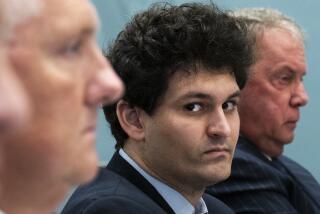Policy Dispute on Gorbachev’s Reforms Goes Public : Diplomacy: The Administration is struggling to conceal doubts that perestroika will succeed.
- Share via
WASHINGTON — A long-simmering dispute within the Bush Administration over how to deal with the Soviet reform effort erupted Friday as the White House confirmed that Secretary of State James A. Baker III had killed a pessimistic speech about perestroika that a senior White House official had planned.
At the center of the dispute, White House Press Secretary Marlin Fitzwater said, are differing views over whether Soviet leader Mikhail S. Gorbachev can succeed with perestroika , or restructuring of Soviet society.
“There are opinions all over the lot” on that issue, Fitzwater said. “The policy is clear about our wanting to support glasnost (openness) and perestroika, “ he added, but officials have “widely varying differences” over the “durability” of Gorbachev’s reform plan.
Taken at face value, Fitzwater’s remarks suggest that Baker is more optimistic about Gorbachev’s chances for success than is the official whose speech he quashed--Robert M. Gates, the President’s deputy national security adviser.
The reality, however, may be more complex: According to some sources, Baker’s objection to the proposed Gates speech was that it represented a public expression of no confidence in Gorbachev at a time when U.S. policy is to support his reform efforts.
“The concern was that a down-beat analysis about the prospects would have looked like we’re assuming Gorbachev is doomed and we’re planning accordingly,” said one official. “No one assumes he faces favorable odds, but we’re out to advance U.S. interests, whoever is in charge there, not discuss Gorbachev’s survivability prospects.”
The Administration’s public view of perestroika’s chances has important political implications at this time, several officials said.
Recently, the Administration has been under fire from Democrats for being too timid and unimaginative in responding to the Gorbachev revolution. Baker helped sidetrack those allegations with two speeches on U.S.-Soviet relations that were clearly upbeat in their outlook, emphasizing opportunities for potential progress. But a new, negative evaluation could have fueled more charges that the Administration speaks with two voices on Soviet policy.
“The White House was sensitive to this matter, too,” said one senior official. “That’s why they sent it (Gates’ speech text) around” for State Department comments.
Fitzwater, responding to a New York Times report Friday on Baker’s blocking of the speech, said that the question of perestroika’s chances is one of “analysis, of interpretation of events that the State Department felt better left unsaid at this point.”
In his public comments on perestroika, Baker has not addressed directly whether he believes the reforms will succeed or fail. He deflects such questions by saying that only the Soviets can make the reforms work and that their success is in the U.S. interest.
Gates, a former deputy director of the CIA, has long taken a skeptical view. The speech he planned to deliver to the National Collegiate Security Conference in Bethesda, Md., was understood to focus more on the obstacles to reform, such as the labor strikes and nationality conflicts in the Soviet Union, than on its limited successes.
The conflict over the speech was the most open airing to date of foreign policy disagreements within the Administration. It was a major departure from the Administration’s usual approach, which strongly discourages public discussion of such disputes.
Officials confirmed that National Security Adviser Brent Scowcroft, in particular, was upset by the public squabble, in which he was forced to mediate between his chief deputy and Baker.
Meanwhile, the State Department issued a 64-page report accusing the Soviet Union of maintaining its propaganda and “disinformation” programs aimed at the United States despite the relaxation of tensions between the superpowers. The report displayed a Cold War tone that has been notably absent from Baker’s recent speeches.
The report said Moscow last year ended a three-year-old effort to convince the world that the AIDS epidemic was the product of a bungled U.S. germ-warfare program. But the State Department said the Soviets were behind a rumor campaign this year claiming that U.S. hospitals were bringing Latin American orphans to the United States for use as organ donors for transplants.
The report also asserts that Moscow has used forged letters and bogus books to spread stories intended to damage U.S. policies. It said Moscow relies on Soviet employees of the United Nations to perform propaganda and intelligence work. “Approximately one-fourth of the Soviets in the U.N. secretariat are intelligence officers,” the report said.
Toth reported from Washington and Lauter from San Jose, Costa Rica. Times staff writers Norman Kempster and Doyle McManus, in Washington, contributed to this story.
More to Read
Get the L.A. Times Politics newsletter
Deeply reported insights into legislation, politics and policy from Sacramento, Washington and beyond. In your inbox twice per week.
You may occasionally receive promotional content from the Los Angeles Times.










